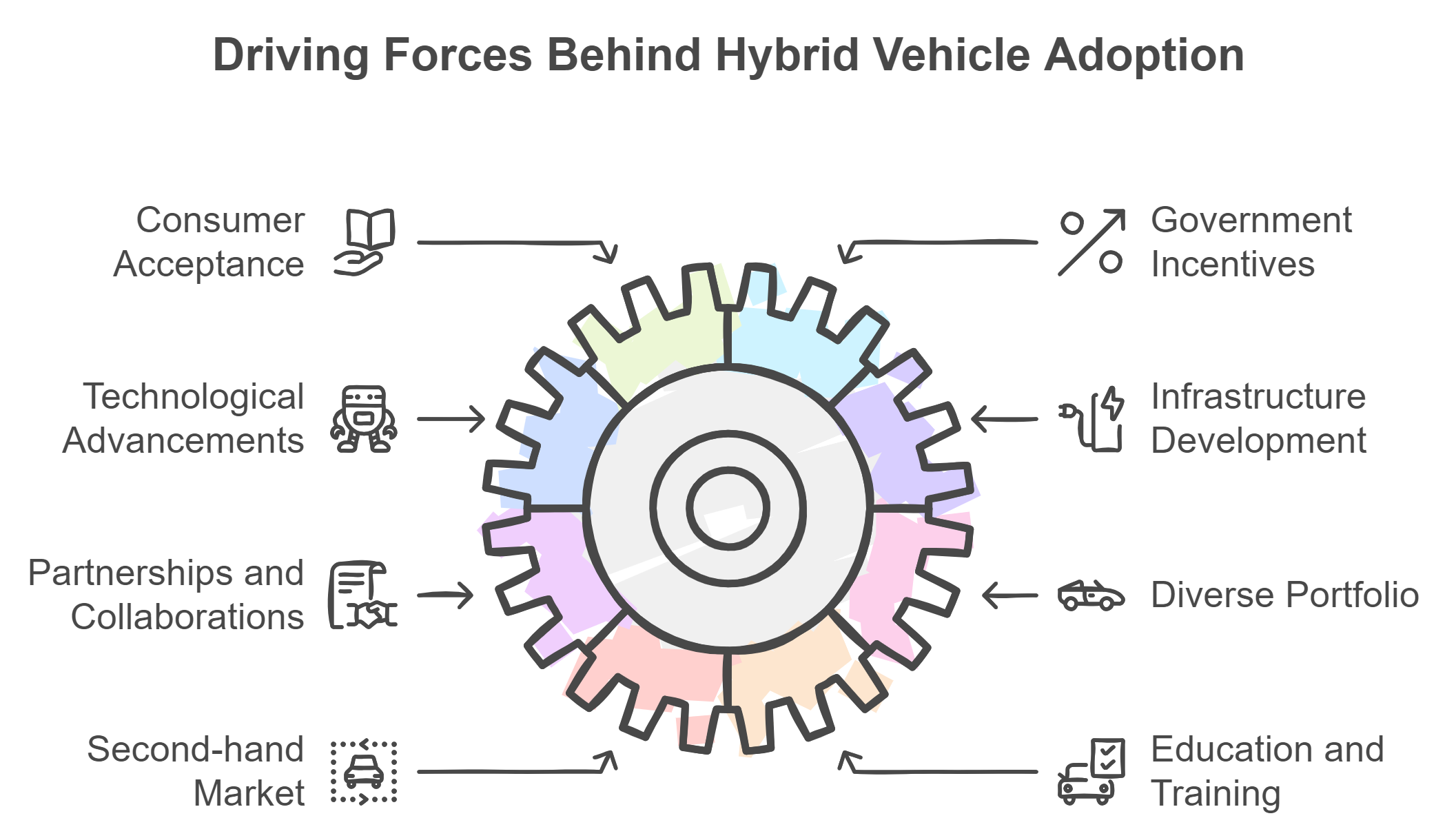Hybrid Electric Vehicle Market Research

As the demand for sustainable and energy-efficient transportation grows, hybrid electric vehicles are taking center stage
Hybrid electric vehicles (HEVs) have become a key player in the shift toward sustainable mobility, combining the benefits of electric and internal combustion technologies—and hybrid electric vehicle market research is essential for businesses navigating this competitive landscape.What Is Hybrid Electric Vehicle Market Research?
Hybrid electric vehicle market research focuses on understanding the trends, behaviors, and technological advancements within the sector. This research helps businesses, automakers, and policymakers understand consumer behavior. It involves analyzing factors such as environmental awareness, cost sensitivity, and performance expectations by identifying what motivates consumers to choose hybrid vehicles over traditional or fully electric ones. Another critical aspect is staying ahead of technological advancements in the HEV industry. Market research tracks innovations in battery efficiency, fuel economy, and hybrid powertrain systems, allowing businesses to align their products with the latest industry standards. Additionally, this research highlights areas of potential improvement, such as enhanced charging infrastructure or the integration of smart driving technologies.Importance of Hybrid Electric Vehicle Market Research

- Guiding Innovation: Through hybrid electric vehicle market research, manufacturers can identify gaps in current technologies and effectively focus their R&D efforts.
- Understanding Consumer Needs: Hybrid electric vehicle market research delves into what buyers truly seek – be it longer range, affordability, or advanced features. Automakers can enhance market acceptance and foster brand loyalty by aligning product offerings with consumer demands.
- Regulatory Compliance: As nations worldwide grapple with climate change, stricter emission norms and regulations are emerging. Hybrid electric vehicle market research keeps manufacturers abreast of these changes, ensuring their hybrids meet or exceed regulatory standards, thus avoiding potential legal pitfalls and leveraging government incentives.
- Strategic Expansion: Different regions may have varying infrastructural capabilities, consumer behaviors, and government policies. Therefore, comprehensive hybrid electric vehicle market research provides a clear picture of which markets are ripe for entry and which pose challenges.
- Competitive Analysis: Like any other, the hybrid market is rife with competition. Through meticulous research, manufacturers can gauge their competitors’ strengths and weaknesses, develop counter-strategies, and identify potential collaboration opportunities.
Key Players in the Hybrid Electric Vehicle Market
In the dynamic landscape of the HEV market, several key players have emerged as trailblazers, consistently pushing boundaries, innovating, and setting benchmarks for others to follow. Their contributions have advanced hybrid technologies and played a major role in molding consumer perception and driving adoption. Here’s an overview of the companies making waves in the HEVs market:- Honda: With models like the Insight and Accord Hybrid, Honda has consistently demonstrated its prowess in hybrid technology. Their focus on creating efficient, user-friendly vehicles has cemented their place as a key player in the sector.
- Hyundai: The Korean automaker has become a significant contender in the hybrid market. Their emphasis on combining efficiency with modern design has resonated well with global audiences.
- General Motors (Chevrolet): GM, through its Chevrolet brand, has ventured into the hybrid space, leveraging advanced battery technologies and innovative drive systems. GM aims to offer consumers a blend of performance and sustainability.
- Mercedes-Benz: This luxury brand is making its mark in the hybrid sector. In recent years, Mercedes has introduced several plug-in hybrid models. Their hybrid lineup, characterized by the perfect blend of luxury, performance, and efficiency, targets a premium audience.
Opportunities Unveiled by Hybrid Electric Vehicle Market Research
The HEV market has become a goldmine of opportunities in an era where environmental concerns mix with technological advancements. As hybrid electric vehicle market research grows, several promising prospects emerge that can significantly benefit manufacturers, consumers, and stakeholders.
- Increasing Consumer Acceptance: As global awareness about climate change grows, consumers are more inclined toward eco-friendly transportation options. This shift in mindset, combined with the practical benefits of hybrids, means a broader market segment for manufacturers.
- Government Incentives: Many governments worldwide are rolling out incentives to promote the use of green vehicles. From tax rebates to grants for R&D, these incentives can lower the cost of production and purchase, driving sales upwards.
- Technological Advancements: The hybrid domain offers a playground for tech innovations, from enhanced battery storage to more efficient energy regeneration systems. Manufacturers have the opportunity to pioneer new technologies, gaining a competitive edge.
- Infrastructure Development: The rise in hybrids calls for expanded charging infrastructure. Collaborative efforts between automakers, governments, and private entities can lead to the rapid development of charging stations, driving further adoption of hybrid vehicles.
- Partnerships and Collaborations: According to hybrid electric vehicle market research, automakers can enhance their offerings by collaborating with tech firms, battery producers, and even competitors. Such collaborations can lead to cost savings, shared expertise, and faster go-to-market strategies.
- Diverse Portfolio: There’s an opportunity to cater to various market segments by introducing a diverse range of hybrid vehicles—from economy and mid-range to luxury and sports hybrids.
- Second-hand Market: As the first generation of hybrid vehicle owners looks to upgrade, a potentially lucrative second-hand market emerges. Certified pre-owned hybrid programs can be a new revenue stream for manufacturers and dealers.
- Education and Training: As hybrids become more common, technicians, mechanics, and sales personnel need specialized training. Automakers can introduce certification programs to ensure their vehicles are serviced correctly and boost brand trust.
- Customization and Personalization: Modern consumers seek vehicles that reflect their personalities and lifestyles. Manufacturers can appeal to a niche yet growing segment by offering customizable hybrid options.
Challenges Unveiled by Hybrid Electric Vehicle Market Research
As companies navigate the transformative landscape of hybrid technology, detailed hybrid electric vehicles market research brings these challenges to the forefront and prepares businesses to overcome these hurdles:- High Initial Costs: Despite the long-term savings they offer, hybrid vehicles still command a premium upfront cost compared to conventional gasoline cars, making them less accessible for many potential buyers.
- Battery Concerns: Issues related to battery life, replacement costs, and disposal impact the appeal of hybrid vehicles. According to hybrid electric vehicle market research, addressing these concerns is vital to gaining consumer trust.
- Limited Charging Infrastructure: While significant cities are expanding their charging networks, many regions still lack adequate charging infrastructure, making it challenging for potential hybrid owners to commit to a purchase.
- Range Anxiety: Even though hybrids can operate on gasoline, the anxiety associated with the electric charge running out in areas without charging infrastructure can deter some buyers.
- Market Saturation: With many automakers entering the hybrid space, there’s a risk of market saturation. Differentiating offerings and standing out becomes increasingly challenging.
- Competition from Fully Electric Vehicles: Hybrids face stiff competition as battery technology improves and the costs of fully electric vehicles decrease. Convincing consumers of the merits of a hybrid over a fully electric vehicle becomes a challenge.
What Makes SIS International a Top Hybrid Electric Vehicle Market Research Company
SIS International stands out as a trusted leader in hybrid electric vehicle market research, providing businesses with critical insights and strategies to succeed in this rapidly growing industry. We deliver actionable data that helps companies stay competitive in the dynamic hybrid electric vehicle market.1. Expertise in Cutting-Edge Research Methods SIS International employs advanced methodologies to uncover meaningful insights into the hybrid electric vehicle market. We ensure a comprehensive understanding of market dynamics, from online focus groups to in-depth interviews and quantitative surveys.
2. Global Reach and Localized Insights With a worldwide presence, SIS International delivers localized insights tailored to regional markets. Whether it’s evaluating consumer attitudes toward hybrids in North America, understanding regulatory impacts in Europe, or exploring infrastructure challenges in Asia, our team provides clients with data that reflects the unique dynamics of each region.
3. Tailored Solutions for Hybrid Electric Vehicle Leaders SIS understands that every business has unique needs. We work closely with clients in the automotive sector to develop customized market research solutions. From identifying consumer expectations for battery life to assessing the impact of government incentives, SIS ensures its research aligns with the specific goals of each project.
4. Experience in Sustainable Automotive Innovations With a long history of supporting sustainable industries, SIS is well-equipped to handle the complexities of the hybrid electric vehicle market. We have partnered with leading automotive brands to explore key areas such as vehicle design, pricing strategies, and market entry opportunities. This experience positions SIS International as a valuable partner for businesses navigating the transition to greener transportation.
5. Commitment to Delivering Actionable Insights SIS International’s focus on providing insights that lead to real-world results is what sets it apart. Our research goes beyond surface-level data, offering strategic recommendations that help businesses refine their products, improve marketing campaigns, and make informed investment decisions.



